Contact UsCONTACT
Please feel free to contact us if you have any questions or concerns.
Inquiry FormStories
STORIES
SERIES EMBARK
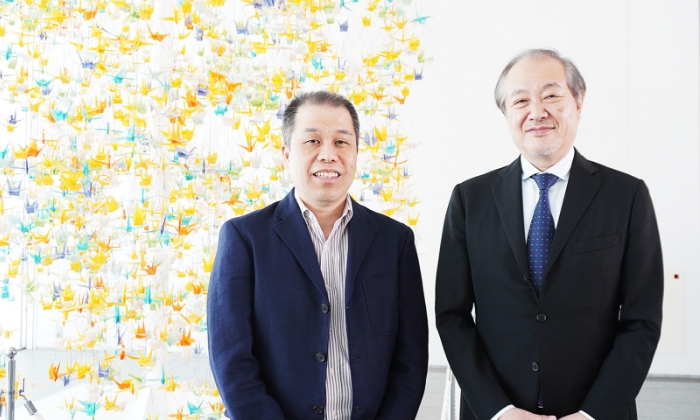
Established in April 2021, Orizuru Therapeutics ("Orizuru Tx") aims to commercialize regenerative medicine and other products derived from iPS cells. The company is charged with the mission of transferring and socially implementing some of the research results from T-CiRA, a joint research program between Takeda Pharmaceutical Company Limited ("Takeda") and the Center for iPS Cell Research and Application (CiRA) at Kyoto University. In addition to Takeda and Kyoto University Innovation Capital (Kyoto-iCAP), Mitsubishi UFJ Bank, SMBC Venture Capital, Medipal Holdings, Sumitomo Mitsui Trust and Banking, Sumitomo Mitsui Finance and Leasing, and Nippon Venture Capital have provided funding for the startup in Seed and Series A. The company raised approximately 6 billion yen, an unprecedented amount for a startup. We interviewed Kenji Nonaka, who was appointed President and CEO at the time of establishment, and Shinji Ogawa, Vice President and COO, who participated in the preparatory committee for the establishment, about the background of the startup and the strengths of the company's iPS cell technology. (Interviewer: Katsuyoshi Masuda)
The T-CiRA framework was led by Dr. Shinya Yamanaka, who researched promising clinical applications of iPS cells and their potential to lead to drug discovery. Specifically, they aimed for clinical applications in disease areas such as cancer, heart failure, diabetes, neurodegenerative diseases, and intractable muscle diseases. Two projects that were close to clinical development were cardiomyocytes for use in the treatment of severe heart failure and islet cells for use in the treatment of type 1 diabetes. However, at the time of 2021, cardiovascular and metabolic diseases were not Takeda's focus areas for R&D, so a new approach was needed for clinical development. Out-licensing to other companies was considered, but it was obvious that the research team would have a higher chance of success if they were involved in the development process in a seamless manner from research to development, so we decided to spin out and establish a new company.
I had been involved in drug discovery research for gastrointestinal diseases at Takeda, but I understood that the company was going to be steered toward cell therapy and regenerative medicine, and I thought it would be useful to be involved in their development, so I joined the company from the preparatory stage of establishing the new company. I also thought it would be a unique experience to be involved in the start-up of a new company. On the other hand, since the new company members were leaving Kyoto University and Takeda to join the new company, I had to make my own decision to transfer to the new company and express my hope to everyone.
Of the approximately 60 people who started at the time of the founding of the company, fortunately more than a dozen transferred from T-CiRA. I assume that it was not because of my persuasion, but because of their strong desire to continue the subject of their research, which they had spent so much passion and time on, until it was implemented in society.
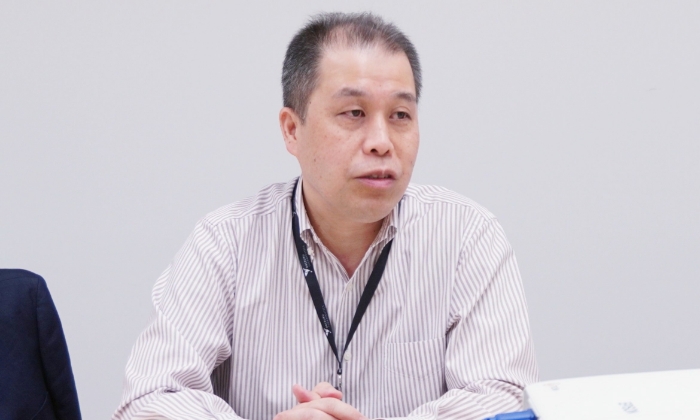
My background includes clinical experience as a cardiac surgeon and commercialization experience in the clinical development departments of foreign pharmaceutical companies, including Banyu Pharmaceutical (now MSD). I had no experience with regenerative medicine products, but I believe this background was one of the reasons I was approached.
When I was leading the development division, I told my subordinates that they should clarify their career visions and work on them over the long term, while I myself concentrated on the task at hand. Therefore, I was passive in my role as president, and I had never thought of launching a venture company. When I was given the opportunity, my first thought was that the seeds of Dr. Shinya Yamanaka's research were very attractive and I was very happy. At the same time, I accepted the position with the hope that I could play a role in contributing to society through the practical application of iPS cells.
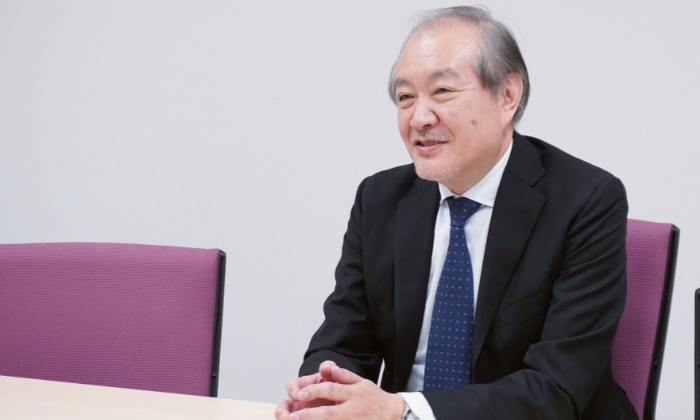
We believe that people who want to work in a start-up company have a strong desire to make their own decisions about what to do, and we wanted to create an organization that respects this desire to the maximum extent possible. To this end, it is important for each employee to be able to think and decide for himself/herself and to have a sense of ownership, the two key elements of which are "the ability to self-manage. It is important for both the individual and the organization to have this ability.
The challenge for research-based startups is that they are very dedicated and serious about their assets, but their projects end in success or failure, so they are unable to take on the next vigorous challenge and stand still or lose their way. In order to grow a company from a startup, there must be a common groundwork to continue the business beyond just the assets on which the startup was based. I believe that only by creating a common platform or a common culture will a company be able to transform itself.
Looking back on my work history, when I was at Abbott, I transferred to AbbVie when it was established as a new company, and I saw how Abbott, a large company, tried to create the culture of a new company from scratch. I have seen Abbott, a large company, try to create the culture of a new company from scratch. I believe that such a culture can be an attraction that keeps people coming back, and I decided to use it as the basis for creating an organization.
Currently, our three main businesses are iPS cell-derived cardiomyocytes (iCM), iPS cell-derived pancreatic islet cells (iPIC), and platform innovation. In the past, Takeda focused on the area of cardiometabolic diseases, so we had an extremely talented and specialized team of researchers. CiRA researchers are also participating in this area, and our strength is the fusion of expertise in the disease area and expertise in iPS cell research.
One of the characteristics in iCM is that it has a manufacturing process with high differentiation efficiency when differentiating iPS cells into cardiomyocytes. To ensure a high level of safety, it is necessary to prevent undifferentiated iPS cells from differentiating into cells other than cardiac muscle. Our differentiation method is characterized by analyzing the mechanism of myocardial differentiation and adding a compound that inhibits differentiation into cells other than myocardial cells. The use of low-molecular-weight compounds also has the advantage of reducing production costs.
The second feature is the high viability of the transplanted cells. It is important that the transplanted cells in the heart work together with the patient's myocardial cells and must be well engrafted at the site of administration. We optimize our differentiation methods to increase viability.
Third, it can be viable in the heart as a single cell without the formation of cell aggregates. The final formulation can be administered by catheter or other means, making the treatment minimally invasive for the patient.
iPIC has also established an original differentiation protocol using a small molecule compound that differs from iCM and allows for similar low-cost production. Pancreatic islets (islets of Langerhans) are responsible for controlling blood glucose levels, with a certain ratio of alpha cells that secrete glucagon, which raises blood glucose levels, and beta cells that secrete insulin, which lowers blood glucose levels. It is important to create iPICs in that ratio, and our technology can create aggregates of cells that reproduce human islet structure. Currently, there is an overwhelming shortage of donors for islet transplants for patients with severe type 1 diabetes. The iPIC is expected to be a very effective treatment for such patients who are waiting for islet transplantation.
The Platform Innovation Business is the development of a regenerative medicine research infrastructure that promotes the utilization of cutting-edge iPS cell technology and peripheral technologies. The Platform Innovation Business supports the research and development of pharmaceuticals based on new drug discovery approaches by utilizing this infrastructure and collaborating with other business companies, etc. Although the profitability of the Platform Innovation Business is completely different from that of the iCM and iPIC businesses, and the scale of the business is not as large, it can be said to be a business that will help iPS cell-based regenerative medicine and pharmaceuticals take root in society. However, it can be said to be a business that will make iPS cell-based regenerative medicine and pharmaceuticals take root in society.
For the two regenerative medicine products, iCM and iPIC, we aim to collect the first clinical data by 2026 and list them on the stock exchange. We have made a commitment to investors at the time of the company's establishment, and we believe that the probability of obtaining clinical data on schedule is high. Since we have confirmed the efficacy and viability of the product in the non-clinical development stage, it is unlikely that this will change in clinical trials, and we believe that the probability of success is high. We plan to conduct the first clinical trial as an investigator-initiated clinical trial at Kyoto University. We need to improve our operations so that the clinical trial can be conducted smoothly.
We are currently developing the first generation of two regenerative medicine products, and will continue to improve the cells in the second and third generations. For example, we will make products with weaker antigen responses and fewer immunosuppressive agents, and we will also make various improvements in transplantation methods. At the same time, third and fourth research and development following iCM and iPIC will be important. For example, if the differentiation and purification technology of iPIC can be transferred to other endocrine cells and there is a need for it, we will develop it.
There are many cases in which a person assumes the position of president, but in the case of Orizuru Tx, we were fortunate in that we were well prepared for the establishment of the company and had support from VCs and other organizations. Naturally, the responsibility increases with the transition to president, but it also broadens one's perspective and makes the decisions one makes more rewarding. If you have the opportunity, I encourage you to take on this challenge. There are not many opportunities like that, so I think you should take the chance and give it a try.
I have worked for major foreign and domestic pharmaceutical companies for more than 20 years. Researchers in particular are highly fluid, with positions disappearing every few years, and the scope of career development may be limited if you only have skills in the research field. Launching or participating in a start-up is an opportunity to be involved in various tasks in addition to research, and it will definitely benefit your future career, so if there is something you want to achieve, I encourage you to take on the challenge. In the past, I think there was a strong image that once you failed at starting a business, your life would also be over, but nowadays there are plenty of people who have failed. By learning from your mistakes, you will have a second or third chance. If you are offered financial support, you are extremely fortunate, and I encourage you to take up the challenge.
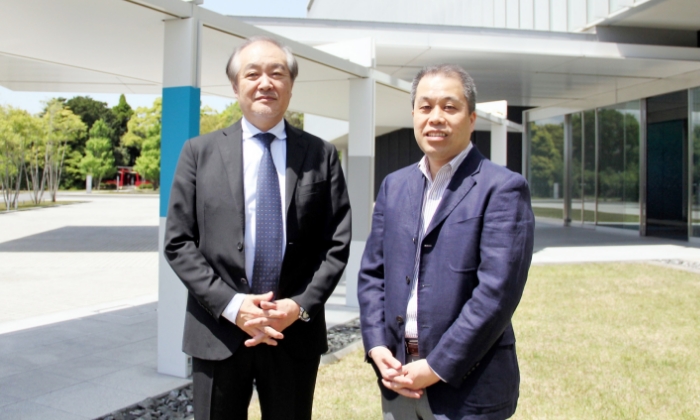
(Interviewed in May 2023. Affiliations, positions, etc. are as of the time of the interview)
Orizuru Therapeutics is an R&D-oriented company specializing in the commercialization of regenerative medicine derived from iPS cells, and based on its world-class scientific and technological expertise in iPS cells and cell transplantation, the company develops its own cell transplantation therapies and supports pharmaceutical companies in their research and development of pharmaceutical products. The development and manufacture of cell transplantation therapies at Orizuru is driven by the same desire as the Japanese culture of carefully folding "orizuru," a paper doll, to wish for peace and good health. Kyoto-iCAP will continue to support Orizuru's activities and hopes that the innovative new medicines they develop will benefit medicine and patients.
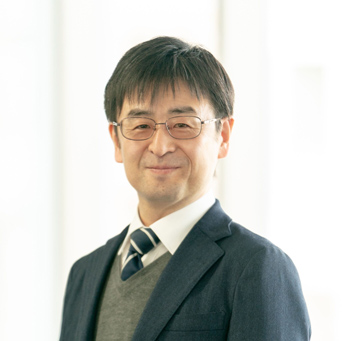
Hiroyuki Ueno

Orizuru Therapeutics Inc. Website
Please feel free to contact us if you have any questions or concerns.
Inquiry Form